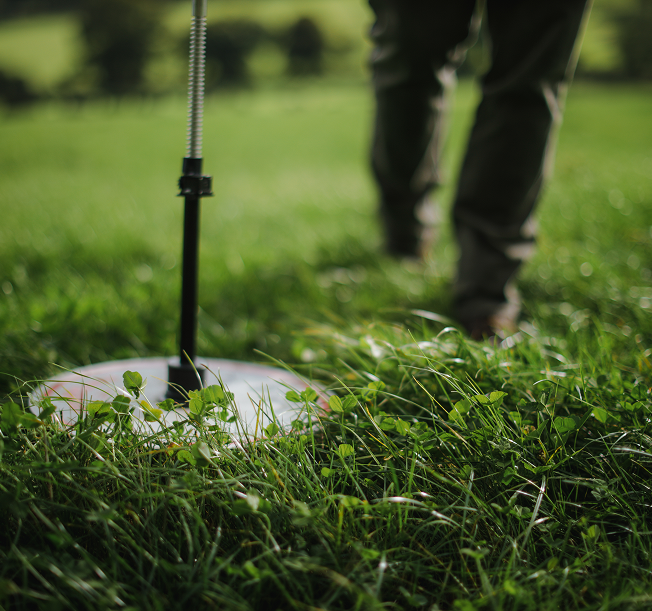Die Vorteile des ökologischen Landbaus:
warum Bio-Rind- und Lammfleisch
die richtige Wahl ist
Bio als nachhaltige Lösung - Besser für den Planeten
- Bio bedeutet, mit der Natur zu arbeiten, nicht gegen sie.
- Die Vorteile der biologischen Produktionsmethoden für die Umwelt und die Biodiversität sind wissenschaftlich erwiesen.
- Biologischer Landbau senkt das Risiko der Umweltverschmutzung und hilft, die Emissionen von Treibhausgasen zu reduzieren, indem die Verwendung von chemischen Düngemitteln und Pestiziden stark eingeschränkt wird.
- Biobauern arbeiten innerhalb natürlicher Systeme und Kreisläufe auf allen Ebenen, vom Boden über Pflanzen bis hin zu Tieren.
- Biobetriebe sind ökologisch vielfältiger als konventionelle Betriebe.

Ökologischer Landbau ist besser für den Boden
Biobetriebe
Kohlenstoffbindung
- Die Böden auf Biobetrieben binden etwa 1,6 Tonnen Kohlenstoff pro Hektar und Jahr.
- Die Verwendung von organischen Düngemitteln wie kompostierten Abfällen aus der Viehzucht, verbesserten Pflanzensorten und Fruchtfolgen, reduzierter Bodenbearbeitung und der Anbau von Deckfrüchten tragen zur erhöhten Kohlenstoffspeicherung bei.
Klimafestigkeit
- Der biologische Anbau kann vor Überschwemmungen schützen, da biologische Böden doppelt so viel Wasser speichern.
- Bioböden schneiden bei Dürreperioden besser ab als konventionelle Böden.
Quelle: IFOAM, 2023
Warum der Boden im ökologischen Landbau so wichtig ist
Die Erhaltung der Bodenfruchtbarkeit und die Vermeidung von Bodenerosion sind eine Herausforderung für alle Landwirte. Anstatt künstliche Düngemittel zu verwenden, kümmern sich Biobauern um ihre Böden, indem sie Mist, Kompost, „Deckfrüchte“ und Fruchtfolgen einsetzen. Weltweit verlieren wir Boden viel schneller, als er sich bildet, nämlich 10 bis 40 Mal schneller. 95 % unserer Lebensmittelproduktion hängt vom Boden ab, daher war es noch nie so wichtig, auf eine Weise zu wirtschaften, die den Boden schützt und erhält.
- Biologischer Landbau ist besser für die langfristige Gesundheit des Bodens.
- Biobetriebe beherbergen eine größere Vielfalt an Mikroben im Boden, was den Pflanzenwachstum ohne künstliche Düngemittel unterstützt.
Ökologischer Landbau ist besser für Wildtiere
Bestäuber spielen eine entscheidende Rolle in der Landwirtschaft, 76 % der weltweit wichtigen Nutzpflanzen und drei Viertel der Nahrungsmittelpflanzen sind auf die Bestäubung durch Insekten angewiesen. Allerdings nehmen die Bestäuber, die für die landwirtschaftliche Produktion unerlässlich sind, ab. Dieser Rückgang wird weitgehend auf intensive landwirtschaftliche Praktiken, insbesondere den massiven Einsatz von Pestiziden, zurückgeführt, der die Insektenpopulationen erheblich beeinträchtigt.
Besser für die Tiere: Ökologische Tierhaltung und Tierschutz
Das Tierwohl ist einer der wichtigsten Aspekte des ökologischen Landbaus. Biostandards bestehen darauf, dass Tiere viel Platz und frische Luft haben und unter Bedingungen gehalten werden, die ihrem natürlichen Verhalten entsprechen. Kleinere Herden und mehr Zugang zum Freien bedeuten, dass Biotiere nicht routinemäßig mit Antibiotika und Entwurmungsmitteln behandelt werden müssen.
Biologische Standards für das Tierwohl
Zugang zu Weiden: Zugang zu Weiden haben, wenn es die Wetter- und Bodenverhältnisse zulassen.
Ausreichend Platz: Sowohl drinnen als auch draußen genügend Platz haben, was Stress und Krankheiten reduziert.
Natürliche Weide: Auf biologischen Weiden natürlich grasen und fressen.
Keine Antibiotika: Nicht routinemäßig Antibiotika erhalten.
Zertifiziert bio
Erfahren Sie mehr über den Biozertifizierungsprozess unserer Produkte.
Grundlagen
Entdecken Sie die Grundprinzipien der Tierhaltung, um Produkte als biologisch zu vermarkten.
Tierschutz
Erfahren Sie mehr über den Tierschutz in biologischen Viehhaltungssystemen.